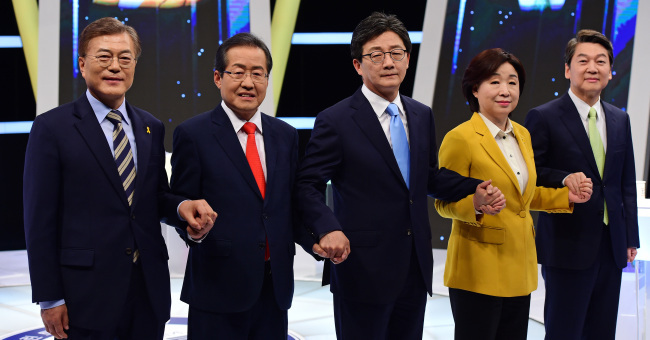
1. Background basics
Conservatives have been in power for the past decade in South Korea, through Presidents Lee Myung-bak and Park Geun-hye. But after months of political turmoil, set off by Park’s corruption scandal and culminating in her impeachment, the pendulum appears to have shifted to the left: Moon Jae-in of the liberal Democratic Party of Korea has been the favorite to win throughout this election’s tight run of 60 days.
Some 26 percent of voters already cast their ballots in the two-day early voting period Thursday and Friday. The election commission expects the total turnout to be one of the highest in recent decades, exceeding 80 percent.
Voting closes at 8 p.m. with exit polls expected shortly afterward and confirmed results projected to come in the early hours of Wednesday morning.
Although it is a by-election in nature, the new president will get a full five-year term, starting immediately upon the reception of the certificate of election from the National Election Commission. This will most likely take place Wednesday morning.
2. Who’s likely to win?
Opinion polls, released right before a ban on releasing polls, all put Moon far ahead of his rivals.
Moon is a lawyer who entered politics as an aide to the late President Roh Moo-hyun in the early 2000s. Since then, he has grown to be a heavyweight himself, once heading the main opposition party and previously running for the presidency in 2012.
His main agenda is, in effect, a complete overhaul of the country, which he and his supporters see as being bogged down in “accumulated evils.”
His plans include increasing transparency and addressing issues that have occurred during the two consecutive conservative administrations, such as the “undemocratic” decision-making process for the deployment of the US’ Terminal High Altitude Area Defense anti-missile system.
3. Who are the other candidates?
In all, 15 candidates entered the race, with some bowing out early on. Apart from Moon, there are four major players.
Hong Joon-pyo of the Liberty Korea Party is the conservative front-runner, while Ahn Cheol-soo of the People’s Party claims to be the champion of the centrists.
In the last batch of polls, Hong made notable rises in popularity and is now claiming he has surpassed Moon in support, and would come out victorious in the end on the back of quickly consolidating conservative votes.
Yoo Seong-min of the minor conservative Bareun Party and Sim Sang-jeung of the Justice Party also remain, having seen their campaigns through to the end despite expectations that they would pull out.
(khnew@heraldcorp.com)





